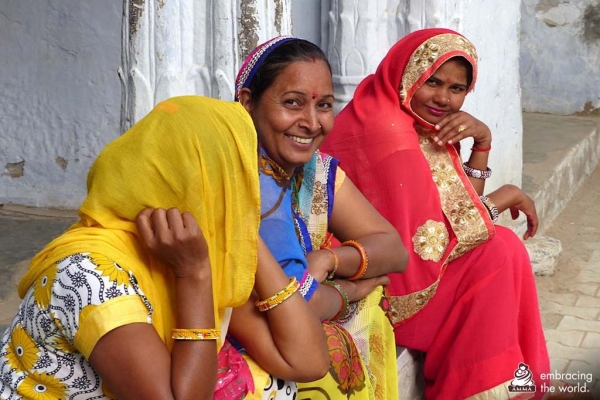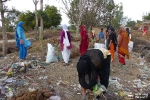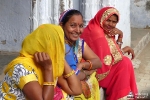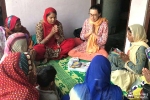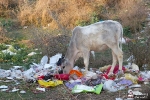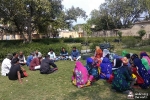For this groundbreaking field project, the team in Kanti was large to say the least. Reena, Priyanka, Suman, Seema, Sugna and Krishna are women from the area who decided to lead the work in coordination with AMMACHI Labs.
For ten days in February, Victoria Falcó with Universitat Jaume I in Spain travelled to Kanti to take part. She is an intern with the Master in International Peace, Conflict and Development Studies, UNESCO Chair Philosophy for Peace. Ramasubramanian S. from Omnex Consulting Company also joined the team.
The project implemented the Japanese 5S methodology, a management tool for workplace organization. It is an abbreviation for five Japanese words: seiri (sort), seiton (set in order), seiso (shine), seiketsu (standardize), and shitsuke (sustain). The system has been used for many years in industry settings.
In addition, Falcó emphasized that the key factor is to acknowledge the cultural context for the lives of these women. As in many places around the world, the women of Kanti live in a male-dominant society that includes direct violence against women.
Falcó’s focus is to empower the women without putting them at risk when they go to work in community cleanups and other awareness actions. At the same time, she said that women and men must be seen as two equal parts of the same equation. One does not rule out the other, so the voices of both must be heard to return to equality and cooperation.
“We must design and implement real solutions for each context patiently and not force actions that put the lives of others at risk in order to bring our project so-called success,” she explained. “Our duty is to understand the project stakeholders. We must see the problems that they face every day--the nature of the conflicts and their vulnerabilities. We must understand what they do, see, listen, and feel to design the tools and solutions.”
The group started by holding 5S awareness activities with local women and schools to share how the system works. Next, they went to work by putting the new cleaning systems into practice in their homes and their village. The team then went one step further and held meetings with local authorities to propose ways to make the new system part of government practice.
Knowledge-sharing sessions were held along every step of the way. Falcó presented to the women how cleaning at the micro-level contributes to restoring our planet’s environmental health at the macro-level.
“We must not forget Nature because if we do, we will also cease to exist,” said Falcó. “To sum up, we have to work with all people and put their lives at the centre to develop a system of solutions. But we must also remember we are a part of nature, so our solutions must also include Nature to ensure harmony and protection.”
This project by AMMACHI Labs stems from its previous successes in partnership with the United Nations Democracy Fund (UNDEF). The focus is community-led initiatives in sanitation, women's empowerment and sustainability. This 5S project ultimately garnered community mobilization, initiated important dialogues, and raised environmental awareness to reduce plastic waste.
Moreover, it also created channels to amplify the voices of women as active agents of social transformation and allowed the women to take initiative in their communities and promote women's rights as human rights.
Photo 1: At work cleaning up public spaces in the village of Kanti, Haryana.Photo 1: At work cleaning up public spaces in the village of Kanti, Haryana.
Photo 2: Suman, Seema and Reena are zonal leaders in Kanti.
Photo 3: Victoria Falcó is with the UNESCO Chair Philosophy for Peace at Universitat Jaume I in Spain and travelled to Kanti to share new ideas.
Photo 4: Public trash in Kanti.
Photo 5: Wildlife are at risk, especially due to plastic pollution.
Photo 6: Men and women gathered to discuss solutions to establish a clean environment and find waste management systems for their village.



